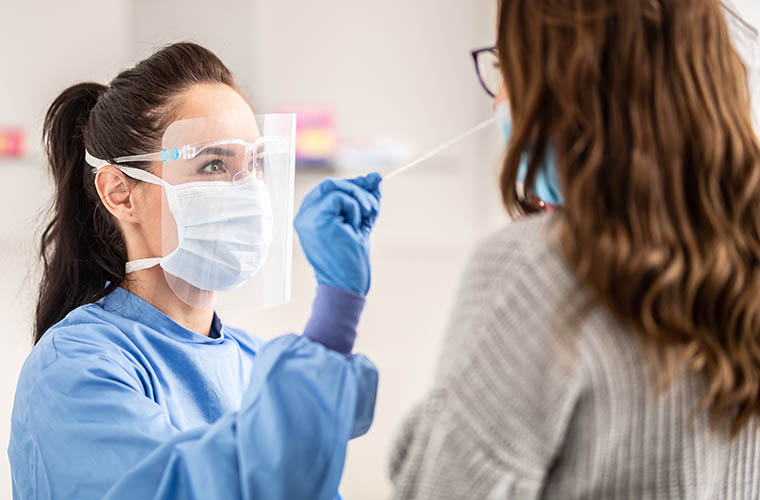Exposed or Sick with COVID? Here is What to Do

COVID-19 is once again spreading quickly across the country, including the Tampa Bay area. Omicron is the dominant variant, triggering a rapid increase of infections.
If you think you’re sick or have been exposed to COVID-19, here is what you need to do to help protect yourself and others.
Sick with COVID-19
If you think you have COVID-19 and are showing severe symptoms like shortness of breath or chest pain, head to the nearest emergency department. This is especially important for those who have underlying health conditions as they can be at higher risk of more severe COVID-19. During this visit, you’ll be evaluated, get tested and receive proper treatment.
If you’re healthy and are showing COVID-19 symptoms, go to the nearest local urgent care or any retail testing location to get tested. Testing will tell you if you have been infected with COVID-19 and help you take proper measures. If you can’t access a test there, go to a county-run testing site and get tested. Find a testing site.
If you can’t get an appointment at any of your local testing locations, purchase a home test. These tests are available for purchase online and many retail stores. If you have symptoms and can’t get tested, you should presume you have COVID-19 and isolate for at least 5 days and wear a mask if around others.
If you have been tested positive for COVID-19 and you’re asymptomatic or your symptoms are resolving (after 24 hours), isolate for five days. Following the isolation, you should wear a medical grade, well-fitted mask for an additional five days to minimize risk of infecting others.
Remember to only go to a BayCare emergency department if you have an emergency. BayCare ERs do not offer free public testing. Getting your COVID-19 test done at a BayCare ER will result in additional facility and physician fees.
Exposed to COVID-19
If you’re exposed to COVID-19 and are unvaccinated, partially vaccinated and not boosted, you should quarantine for at least five days and wear a medical grade, well-fitted mask when around others.
- If you develop symptoms, get tested immediately and isolate until you receive test results. If you test positive, follow isolation recommendations as noted above.
- If you do not develop symptoms, get tested five days after you had close contact with someone with COVID-19. If you test positive, you should isolate for at least five days after your positive test. If you test negative, you can leave your home, but continue to wear a medical grade, well-fitted mask when around others for at least ten days.
- Whether you test positive or not, you should avoid high risk settings and people who are immunocompromised for at least 10 days.
If you’re exposed to COVID-19 and are fully vaccinated, boosted or had confirmed COVID-19 in the last few weeks (since end of December), you do not need to quarantine. However, you must wear a medical grade, well-fitted mask for 10 days after exposure.
- It’s also recommended that you get tested at least five days after you were in close contact with someone with COVID-19.
- If you test positive or develop COVID-19 symptoms, isolate following recommendations above.
Get Protected
Everyone eligible should get vaccinated. Vaccines are the best line of defense against serious complications from a COVID-19 infection. Scientific data has shown that COVID-19 vaccines approved by the U.S. Food and Drug Administration (FDA) including Pfizer, Moderna and Johnson & Johnson, can help prevent serious complications from the virus, hospitalizations and even death.
If you’re eligible for a booster shot, a single booster shot from the FDA-approved vaccines is available for vaccinated individuals over 12 years of age. Studies show those who are fully vaccinated and boosted, have an 85 percent protection against COVID-19. While those who are vaccinated and not boosted have a 50 percent protection against the virus.
Practice Safety Measures
Whether you’re vaccinated or not, it’s important to continue to practice safety measures to help slow the spread of the virus. First and foremost, wear a medical grade, well-fitted mask, and properly social distance in crowded and inadequately ventilated spaces. Frequently wash your hands. The more often you wash your hands, the less likely the virus will infect you or others.
For more information on COVID-19, visit BayCare.org/Coronavirus.
